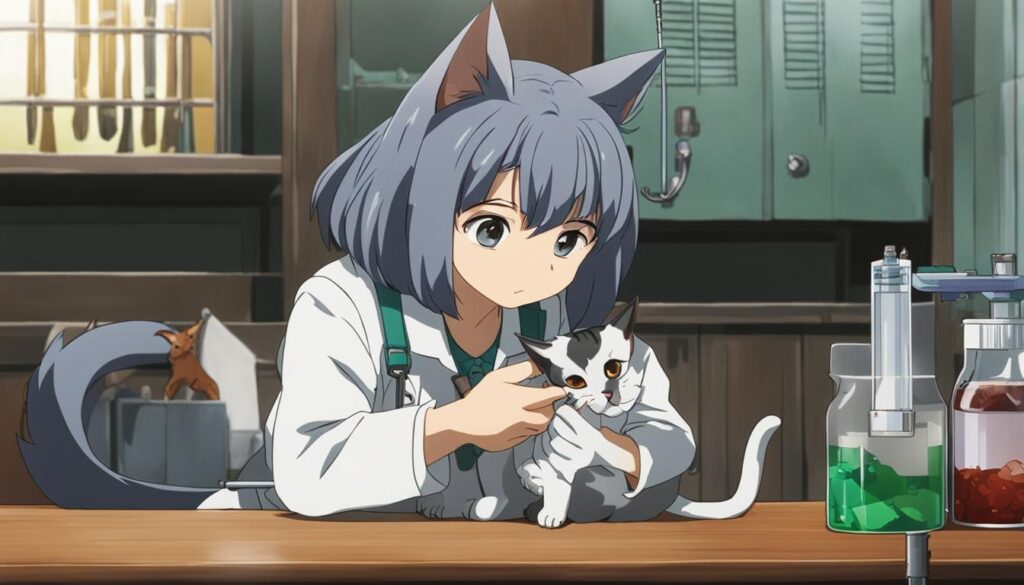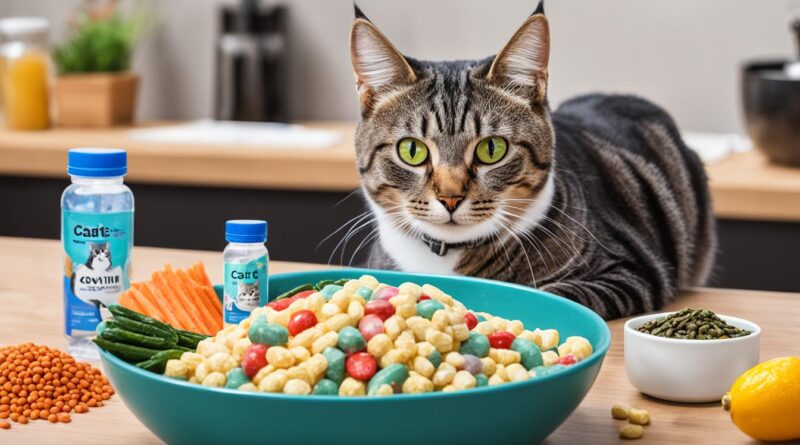Understanding Cat Vomiting: Causes, Treatment, and Prevention
As cat owners, it’s common to see our furry friends occasionally vomit. While it may seem like nothing out of the ordinary, frequent vomiting can signal an underlying health issue that needs attention. In this article, we will explore the causes of cat vomiting, treatment options, remedies, and prevention strategies, so you can take better care of your feline companion.
Key Takeaways
- Cat vomiting can be caused by various factors, including dietary issues and health conditions.
- Treatment options range from at-home remedies to seeking veterinary care.
- Helpful tips for managing cat vomiting include adjusting feeding habits and minimizing stress.
- Preventive measures, such as a balanced diet and regular vet check-ups, are vital for maintaining a healthy digestive system.
- Understanding and preventing cat vomiting is essential for your cat’s well-being.
Common Causes of Cat Vomiting
Cat vomiting is a common issue that can be caused by various factors. Understanding the causes is essential for managing this condition effectively and ensuring your cat’s overall health and well-being. Some of the most common cat vomiting causes are:
| Cause | Description |
|---|---|
| Dietary indiscretion | Eating too much too fast, or eating something they shouldn’t have |
| Hairballs | A build-up of hair in the stomach that is regurgitated by the cat |
| Gastrointestinal obstruction | A blockage in the digestive system that causes vomiting |
| Intestinal parasites | Worms or other parasites that cause gastrointestinal distress |
| Feline inflammatory bowel disease | A chronic gastrointestinal disorder that can cause vomiting and diarrhea |
In addition to the above, cat vomiting can also be caused by other underlying health conditions, such as liver or kidney disease, pancreatitis, and cancer. It’s important to consult with your veterinarian if your cat is experiencing persistent or severe vomiting.
Treating Cat Vomiting
Dealing with cat vomit can be a messy and unpleasant experience, but fortunately, there are various treatments available to help manage the issue. The choice of treatment depends on the severity of the vomiting and the underlying cause.
At-home remedies such as withholding food for 12-24 hours, giving small amounts of water, and feeding bland foods like boiled chicken or rice can help soothe your cat’s upset stomach. However, if vomiting persists or your cat shows signs of dehydration, it’s essential to seek veterinary care immediately.
Veterinarians may prescribe medication to manage your cat’s symptoms, such as anti-nausea medication, appetite stimulants, or antibiotics if there is an underlying infection. Additionally, your vet may recommend dietary changes or therapeutic diets to address your cat’s specific nutritional needs.
When to Seek Veterinary Help
If your cat has been vomiting persistently for more than a day, is lethargic, refuses to eat or drink, or shows signs of dehydration such as sunken eyes, dry mouth, or listlessness, it’s crucial to seek veterinary care immediately.
“If your cat is vomiting regularly or if the vomit is continuous, your cat may be suffering from an underlying medical condition, and a vet’s opinion is particularly important,” says Dr. Jackie Parr, a veterinarian with over a decade’s experience in treating felines.
Remember, cats are experts at hiding signs of illness, so it’s essential to pay close attention to their behaviour and seek veterinary help promptly when needed.

Helpful Tips for Managing Cat Vomiting
Caring for a cat that suffers from vomiting can be distressing for both the owner and the feline companion. However, knowing how to manage it can alleviate stress and improve your cat’s well-being. Here are some helpful tips for managing cat vomiting:
- Adjust feeding habits: Some cats are more prone to vomiting than others. Reducing the portion sizes and increasing the frequency of meals can help ease digestion and reduce vomiting. Moreover, make sure to switch to high-quality, protein-rich food that is free from triggers like dairy, uncooked meat, and soy.
- Minimize stress: Cats can experience vomiting due to stress, resulting from changes in their environment, loud noises, or exposure to other animals. It’s crucial to keep your cat comfortable and relaxed, by creating a quiet and safe space, and limiting the exposure to triggers that can cause stress.
- Introduce preventive measures: Regular grooming, choosing a suitable litter box, and promoting hydration by providing easy access to fresh water can aid in preventing cat vomiting. Additionally, adding supplements like probiotics to their diet can improve digestion and reduce vomiting.
It’s important to remember that each cat is unique, and may require a different approach to managing vomiting. Consulting with a veterinarian, and keeping a record of the frequency and nature of the vomiting can be beneficial in determining the cause of it. With patience and a little bit of effort, you can help your cat overcome this issue and live a happier, healthier life.
Preventing Cat Vomiting
If you’re looking for effective ways to prevent your cat from vomiting, follow our prevention tips to maintain your cat’s digestive health.
Establish a Balanced Diet
A balanced diet is essential for a cat’s overall health. Feeding your cat a diet that meets their nutritional requirements can help prevent vomiting. Avoid feeding table scraps as they can cause vomiting and other digestive issues. Consult with your veterinarian for dietary recommendations and guidance.
Promote Hydration
Dehydration is a major contributor to vomiting in cats. Ensure your cat has access to clean, fresh water at all times. If your cat struggles to drink enough water, consider adding wet food to their diet, which naturally increases hydration.
Provide Regular Veterinary Check-ups
Regular veterinary check-ups can catch potential health issues early, preventing vomiting and other digestive complications. Your veterinarian can recommend preventative measures, such as vaccinations and deworming, to keep your cat healthy and happy.
“By establishing a balanced diet, promoting hydration, and regular veterinary check-ups, you can effectively prevent cat vomiting and ensure a happy feline companion.”
Conclusion
We hope this article has provided you with essential insights into managing and preventing cat vomiting. Remember that seeking veterinary care when necessary is crucial to ensure your cat’s well-being. Some effective cat vomiting remedies include modifying your cat’s diet, providing plenty of water, minimizing stress, grooming your cat regularly, and offering hairball remedies.
By implementing these preventive measures and paying attention to your cat’s overall health, you can help reduce the occurrence of cat vomiting and promote a healthy lifestyle for your feline companion. Always be gentle with your cat and provide them with a comfortable and safe environment.
Thank you for reading! We hope this article has been informative and helpful. If you have any questions or concerns, don’t hesitate to speak with your veterinarian for further information and advice.
FAQ
What are the common causes of cat vomiting?
Cat vomiting can be caused by various factors, including dietary indiscretion, hairballs, underlying health conditions, and even stress. It’s important to identify the root cause to effectively manage the issue.
How can I treat cat vomiting?
Treatment for cat vomiting may vary depending on the cause. At-home remedies such as withholding food for a few hours or feeding a bland diet can help soothe your cat’s stomach. However, if the vomiting persists or is accompanied by other concerning symptoms, it’s important to consult a veterinarian for proper diagnosis and treatment.
What are some helpful tips for managing cat vomiting?
To manage cat vomiting, consider feeding smaller, more frequent meals to prevent overeating. Minimizing stressors in your cat’s environment and grooming them regularly to reduce hairballs can also be helpful. Additionally, keeping your cat hydrated and providing them with a balanced diet can contribute to their overall digestive health.
How can I prevent cat vomiting?
Preventive measures are key in preventing cat vomiting. Ensure your cat has a balanced diet that meets their nutritional needs and avoid sudden changes in their food. Promote hydration by providing fresh water and consider incorporating canned food into their diet. Regular veterinary check-ups can also help identify any underlying health conditions early on.
Why is understanding the causes and treatment options for cat vomiting important?
Understanding the causes and treatment options for cat vomiting is crucial for every cat owner. It allows you to address the issue effectively, provide your cat with the necessary care, and improve their overall well-being. By implementing preventive measures and seeking professional help when needed, you can ensure a healthier and happier feline companion.

